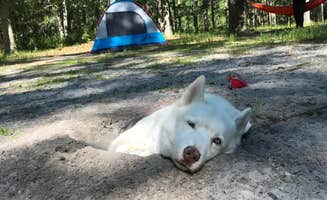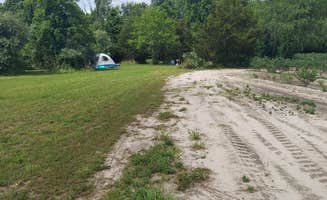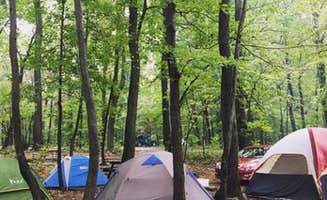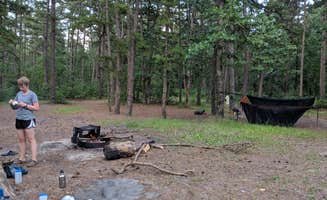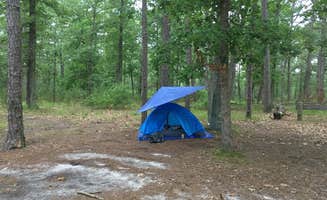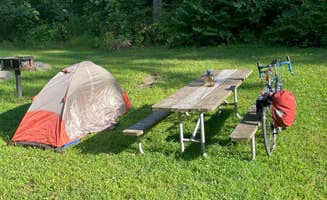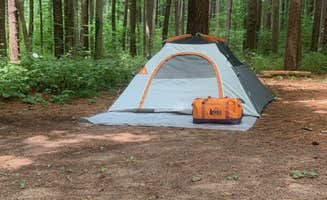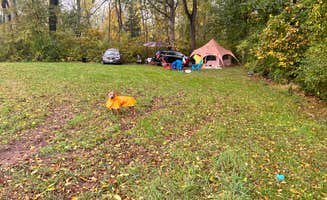Wharton State Forest tent campsites near National Park, New Jersey offer camping opportunities in the unique Pine Barrens ecosystem with sandy soil instead of rocky terrain. The water in nearby streams has a distinctive brown color from natural tannins but remains safe to filter for drinking. Most remote sites require hiking several miles on marked trails through pitch pine forests with elevations rarely exceeding 200 feet above sea level.
What to do
Kayaking the Mullica River: Mullica River Campground provides boat-in access for paddlers seeking backcountry tent camping experiences. "I go camping here almost every year and they a nice open field with two sites and two fire pits. They also have a tone of trails to hike on," notes a visitor to Ridley Creek State Park.
Hiking the Batona Trail: The 50-mile trail passes directly through the Batona Campground in Wharton State Forest. "The Batona Campground in Wharton State Forest is a small campground best suited for tent campers. It can get busy (and rowdy) on weekends. The road into the campground is sand," according to a recent camper.
Exploring historical sites: Washington Crossing State Park offers tent campsites with historical significance. "Washington's crossing is beautiful and historic. We often bike along the canal there. There are farms and animals to see, hikes along the Delaware river, Bowman's tower with a great view of the surrounding area and much more," shares one visitor.
What campers like
Sandy soil for comfortable sleeping: The Pine Barrens' unique sandy ground makes for comfortable tent placement without rocks. "I had the best time here hiking up and down the mini mountains. The water was clear and beautiful and I absolutely loved it," mentions a visitor to Ridley Creek State Park.
Secluded camping options: Many tent campers appreciate the remote feeling despite proximity to urban areas. According to one camper at Wharton State Forest Goshen Pond Campground, "The boyfriend and I stayed for a weekend at one of the primitive tent sites. Our site was private and secluded. We had a great time."
Direct water access: Several campgrounds provide immediate access to rivers or ponds. "This campground (Goshen Pond) was mostly empty while we were there in August. Our site was very quiet, but a lot of the sites are close together without any barriers, so if the campground got crowded it wouldn't be very private. It's only a one minute walk from the parking area to the site. Our site was right next to the Mullica River, and had excellent views if you walked just a couple steps from the tent."
What you should know
Limited amenities: Most tent sites have fire rings but lack modern facilities. A reviewer at Fort Washington State Park notes, "There's at least two fire pits per camp ground. There's only group camping. The give you firewood—-if you bring your own, leave with any left over."
Insect precautions: The Pine Barrens are known for ticks and chiggers. "Great sites, great trails, lots of hiking and off road trails for dirt bike/atv/ trucks. Pretty good boating/ fishing. Just gotta check often for chiggers and ticks," warns a camper at Goshen Pond.
Seasonal water sources: Water availability varies by season at most tent campgrounds. "A water pump provides fresh water but is not available in the winter. There's at least two pit toilets in the campground - don't expect luxury. Bears frequent this campground so be bear aware and practice proper food storage," mentions a camper about Batona Campground.
Tips for camping with families
Choose walk-in sites for quieter experience: Some campgrounds offer walk-in only sites that reduce vehicle noise. "Really liked this campground. I like campgrounds which have you park off and walk in to your site. There is more foot traffic, but you don't hear as many cars coming and going and driving past your site all the time," notes a camper at Wharton State Forest Goshen Pond Campground.
Bring water filtration systems: The brown-tinted water requires proper filtration. "We stayed at the Mullica River camp ground it is a hike or boat in only camp ground has a pump to get water and 2 outhouses (hold your breath) start hike kayak trIp at 206 hike 6 miles in camp then hike kayak out 5 miles to batsto," shares a visitor to Mullica River Campground.
Plan day trips to nearby attractions: Several historical sites and natural areas surround the tent campsites. "This place is amazing! I had the best time here hiking up and down the mini mountains. The water was clear and beautiful and I absolutely loved it," reports a camper at Ridley Creek State Park.
Tips from RVers
Limited RV access at most primitive sites: Few tent campgrounds in the region accommodate large recreational vehicles. At Green Lane Park, a visitor notes, "Green Lane Park is a lovely park with a small campground. The spaces are right on top of each other with no tree cover between spots, so you'll definitely be right up on your neighbors. The fire rings are big and frustrating, the fire sits on a lifted grate so you go through wood like crazy."
Consider campgrounds with electrical hookups: Some parks offer tent sites with limited RV amenities. "Green Lane is a beautiful park with a small campground. The spaces are right on top of each other with no tree cover between spots, so you'll definitely be right up on your neighbors," mentions a camper about Green Lane Park.


